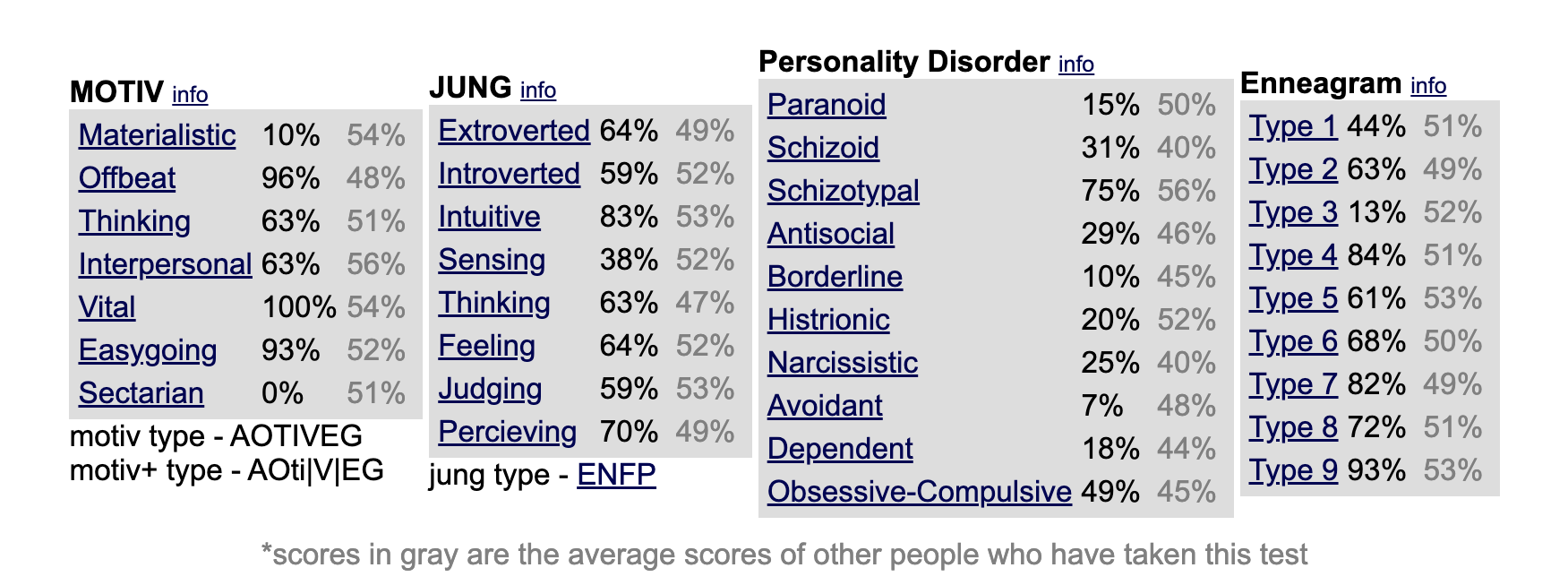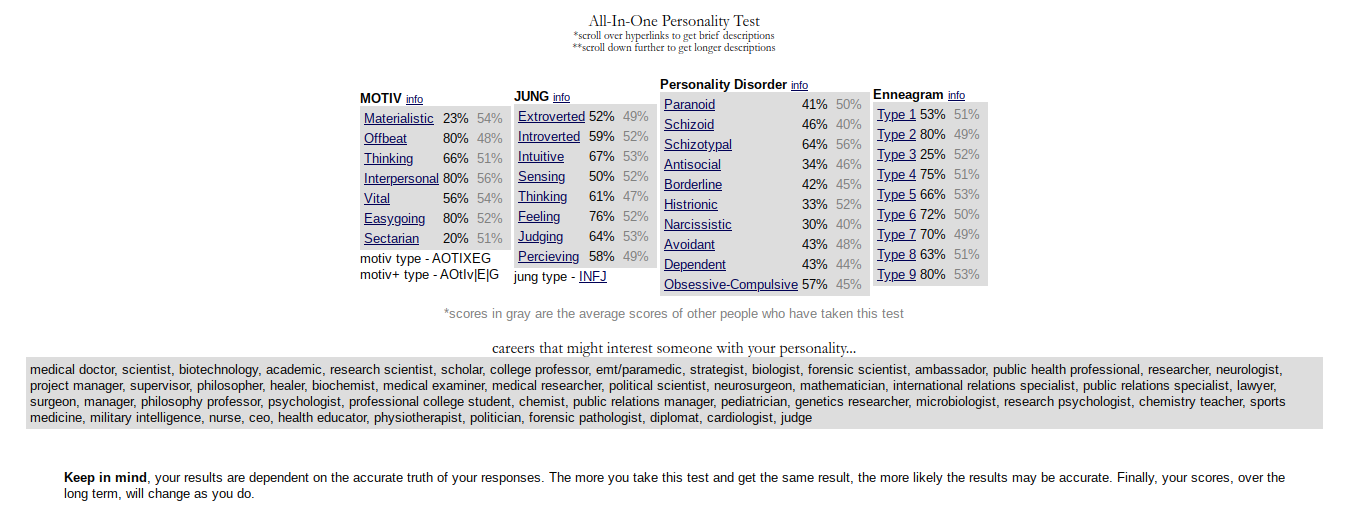aeon is: Ascetic, Offbeat, Thinking, Interpersonal, Vitalist, Easygoing, Globalist
careers that might interest someone with your personality...medical doctor, scientist, biotechnology, academic, research scientist, scholar, college professor, emt/paramedic, strategist, biologist, forensic scientist, ambassador, public health professional, researcher, neurologist, project manager, supervisor, philosopher, healer, biochemist, medical examiner, medical researcher, political scientist, neurosurgeon, mathematician, international relations specialist, public relations specialist, lawyer, surgeon, manager, philosophy professor, psychologist, professional college student, chemist, public relations manager, pediatrician, genetics researcher, microbiologist, research psychologist, chemistry teacher, sports medicine, military intelligence, nurse, ceo, health educator, physiotherapist, politician, forensic pathologist, diplomat, cardiologist, judge
-------
Materialistic vs Ascetic
This trait measures your investment in Social validation
Materialistic – oriented towards wanting to be attractive and impressive to others. Often externally narcissistic, seeking to be whatever the external world deems best. The Materialist values beauty, attractiveness foremost. They are more likely to be into fashion, fancy things (cars, houses, etc.).
Ascetic – shuns the material world, external ideals, public opinion, and the need to find validation in their social rank/status, physical beauty. They are thus internally narcissistic, only caring about what they think is valuable. They tend to want to live apart from society, outside of it, in the metaphorical or actual wilderness.
Offbeat vs Conventional
This trait measures your preference for New Ways vs Old Ways
Offbeat – seeks to live on the vanguard of existence, to step into the unknown. What is the point of living a life that has already been lived before is the ethos of the Offbeat individual, to sacrifice who you were, are, to become something new, different.
Conventional – more likely to fear change and sometimes even desires an older more simple existence. Some conventions have their place and you can't constantly reinvent better ways to do things at every moment.
Thinking vs Haphazard
This trait measures Executive function development
Thinking – prime motivation is to have a planned out life, to know where they are headed. Essentially, they desire predictability, security, certainty, order. It is not enough to understand that something feels good or that something works, the Thinker needs a more rational understanding so they can achieve reliable results in life.
Haphazard – shuns or finds it difficult to be structured and orderly, to make and follow long term plans. Consequently, they tend to live a more unplanned, meandering life, relying more on chance. This makes them less stiff, less rigid than thinkers can be (at their worst). But it also makes them basically stuck in the mental development of a child.
Interpersonal vs Withholding
This trait measures whether you are Othercentric or Selfcentric
Interpersonal – are more about others than themselves and would rather hurt them-self than hurt another person. They don't help others to get something back, they help others because they are more wired to the needs of others than their own needs. They feel the hunger, pain, happiness in someone else more than in themself.
Withholding – more disagreeable/unaccommodating/selfish than most people. An extreme Withholding preference is one aspect of all sociopaths of the world. Withholding types lack empathy towards others, which means they are more likely to be ignorant or inconsiderate of the welfare of others.
Vital vs Depressive
This trait measures your Mental/Physical Health
Vital – content, positive, high energy, life enjoying, optimistic, strong will to live, self motivated. Vitals believe happiness is something you have control over.
Depressive – identity confusion, poor motivation, feel they have no control over life, feel unable to change their circumstances, feel broken, feel that being optimistic leads to disappointment, self destructive, have a defeatist outlook on life.
Easygoing vs Rigid
This trait measures your preference for Relaxation
Easygoing – compelled to relax, take it easy, does not get worked up about most things. Prefers peacefulness and leisure, does not like conflict.
Rigid – does not enjoy or is incapable of enjoying taking it easy.
Sectarian vs Globalistic
This trait measures your preference for Social Organization
Sectarian – believes in putting their tribe/culture/nation first, weary of outsiders, prefers homogeneity to diversity, favors strong leaders, more likely to be authoritarian, thinks multi culturalism is dangerous.
Globalistic – cosmopolitan, tolerant of diversity, believes the welfare of everyone is important (not just one's group), more likely to be politically liberal.
-------
Eccentric Personality Disorders: Paranoid, Schizoid, Schizotypal
Individuals with these disorders often appear odd or peculiar.
Paranoid Personality Disorder – individual generally tends to interpret the actions of others as threatening; preoccupied with suspiciousness/paranoia. They are stuck between their need for others and their mistrust of others.
Schizoid Personality Disorder – individual generally detached from social relationships, and shows a narrow range of emotional expression in various social settings; emotional zombies who stopped feeling due to trauma(s) and/or can't feel due to organic depression.
Schizotypal Personality Disorder – individual is uncomfortable in close relationships, has thought or perceptual distortions, and peculiarities of behavior; preoccupied with seeing themselves and/or the world as strange/odd.
Dramatic Personality Disorders: Antisocial, Borderline, Histrionic, and Narcissistic
Individuals with these disorders have intense, unstable emotions, distorted self-perception, and/or behavioral impulsiveness.
Antisocial Personality Disorder – individual shows a pervasive disregard for, and violation of, the rights of others; Preoccupied with disdain/contempt for others and often a need for control/power over others.
Borderline Personality Disorder – individual shows a generalized pattern of instability in interpersonal relationships, self-image, and observable emotions, and significant impulsiveness. Core issue is an inability to regulate emotions.
Histrionic Personality Disorder – individual often displays excessive emotionality and attention seeking in various contexts. They tend to overreact to other people, and are often perceived as shallow and self-centered. Core issue is attention addiction.
Narcissistic Personality Disorder – individual has a grandiose view of themselves, a need for admiration, and a lack of empathy that begins by early adulthood and is present in various situations. These individuals are very demanding in their relationships. Core issue is entitlement.
Anxious Personality Disorders: Avoidant, Dependent, Obsessive-Compulsive
Individuals with these disorders often appear anxious or fearful.
Avoidant Personality Disorder – individual is socially inhibited, feels inadequate, and is oversensitive to criticism. Core issue is an inability to resolve their codependent need for connection with their codependent fear of rejection and/or discomfort/anxiety around others.
Dependent Personality Disorder – individual shows an extreme need to be taken care of that leads to fears of separation, and passive and clinging behavior. Core issue is the need to be parented by others (i.e. avoid growing up / becoming self-sufficient).
Obsessive-Compulsive Personality Disorder – individual is preoccupied with orderliness, perfectionism, and control at the expense of flexibility, openness, and efficiency. Core issue is mental and behavioral rigidity/inflexibility.
-------
Type One
Healthy Type 1: The Upstanding Citizen
hard working, does more than is expected of them; finishes most things they start; ethical
Average Type 1: The Perfectionist
clean, neat, punctual, organized; responsible, conscientious, tries to live up to morals
Unhealthy Type 1: The Anal-Retentivist
rigid, inflexible, obsessive compulsive, overly traditional
Type Two
Healthy Type 2: The Humanitarian
bigger picture compassion; wants to make a difference in the world not just with loved ones
Average Type 2: The Helper
considerate, compassionate; sensitive to the needs of others particularly loved ones
Unhealthy Type 2: The Martyr
has no identity outside of relationships and will unravel at the loss of those relationships
Type Three
Healthy Type 3: The Performer
impressive without being arrogant, can effortlessly handle the spotlight, skilled performer/entertainer.
Average Type 3: The Histrionic
preoccupied with fame, prestige, social status/attractiveness; wants others to find them impressive.
Unhealthy Type 3: The Envyist
longs for what they don't have; competitive; envious; will act inappropriately in order to get attention
Type Four
Healthy Type 4: The Revolutionary
edgy, breaks new ground, pushes the envelope, creative/artistic, intuitive
Average Type 4: The Unconventionalist
different, idiosyncratic, experimental, unique, open
Unhealthy Type 4: The Stranger
cut off from reality, delusional, bizarre/schizotypal/schizophrenic, irrational, masochistic
Type Five
Healthy Type 5: The Innovator
discovers/develops new technologies or systems of thought which are useful to others
Average Type 5: The Intellectual
enjoys philosophical discussion/debate, endlessly curious, loves to learn, thoughtful
Unhealthy Type 5: The Nihilist
struggles with the meaninglessness of existence, detached, hermetic, cold, devoid of feelings
Type Six
Healthy Type 6: The Security Expert
sees dangers before others, skilled at averting danger, capable of bravery
Average Type 6: The Cautioneer
safe, secure, stable, reliable, predictable, cautious
Unhealthy Type 6: The Paranoid
suspicious, jealous, into conspiracy theories, unsure, fearful, erratic
Type Seven
Healthy Type 7: The Adventurer
fearless, full of energy, lives fully in the moment, improvisational, endlessly optimistic
Average Type 7: The Thrill Seeker
exciting, fun, life of the party, exploratory, spontaneous, loquacious
Unhealthy Type 7: The Hedonist
escapist, hedonist, avoids responsibility, health problems as a result of the aforementioned
Type Eight
Healthy Type 8: The Leader
assertive, dominant, fearless, powerful
Average Type 8: The Challenger
intimidating, prone to anger, will not back down, sarcastic, challenging
Unhealthy Type 8: The Bully
rage-aholic, controlling, abusive, violent
Type Nine
Healthy Type 9: The Stoic
quietly strong, puts others at ease, wise, skilled mediator, unpretentious
Average Type 9: The Monk
nice, easy-going, placid, peaceful, agreeable, grounded
Unhealthy Type 9: The Slacker
lazy, passive, irresponsible, undeveloped, lost, spacey, overly compliant
Cheers,
Ian



